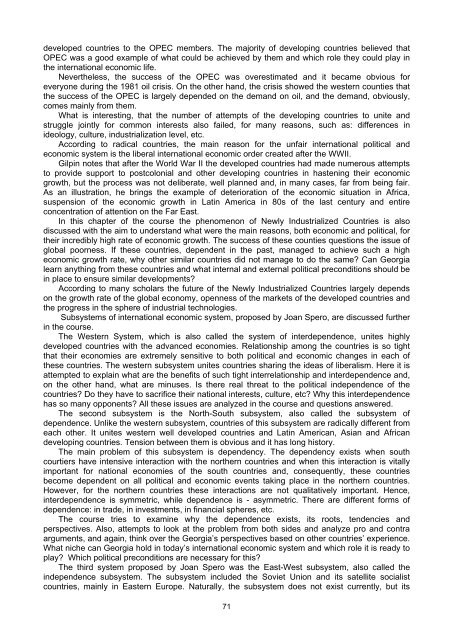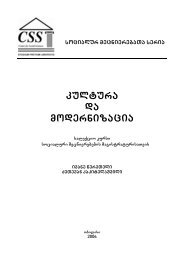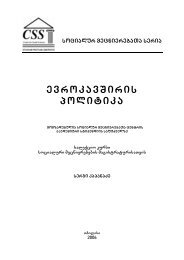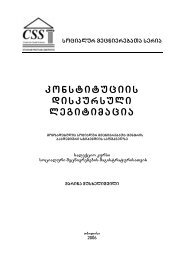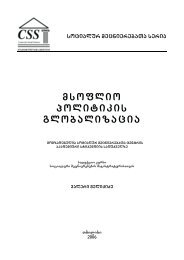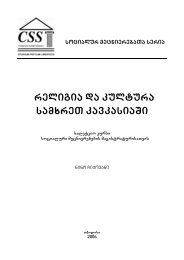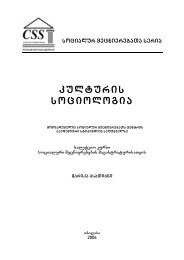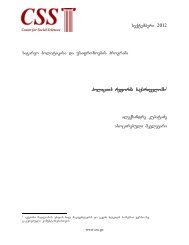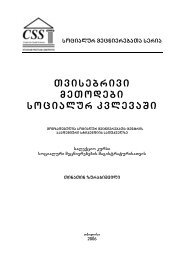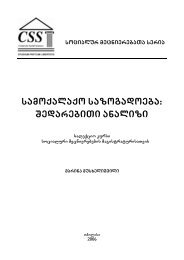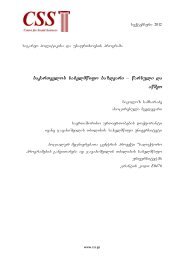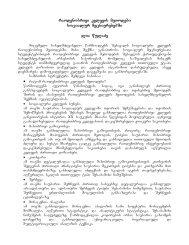currency.Further, the course describes the Breton-Woods monetary institutions – the World Bank andthe International Monetary Fund and tries to explain the reasons <strong>for</strong> criticizing their activities,especially from the less developed countries’ side.Since Georgia is a member of both of these organizations from 1992, the course also attemptsto analyze IMF and WB activities in Georgia. What kind of political and economic benefits thecountry has received from their work, if it has ever? Why and who is criticizing these institution inGeorgia and what the country like Georgia should do to use the assistance provided by theseinstitutions most efficiently.Similar to the financial situation, state of the trade sphere after the WWII was also far frombeing perfect. The course touches upon the United States leadership in the post-war periodinternational trade system and analyses its reasons. General Agreement on Tariffs and Trade(GATT) is also one of the Breton-Woods institutions, created with the aim to achieve free and fairtrade through reducing tariffs and removing other trade barriers. The major rule <strong>for</strong> implementingfree trade was the principle <strong>for</strong> non-discrimination (most-favored-nation principle). The secondelement of non-discrimination was the provision <strong>for</strong> national treatment designed to preventdiscrimination against <strong>for</strong>eign products after they enter a country.GATT was associated with the club of rich countries and was seriously criticized by developingcountries. As many of them acknowledged, the system worked very well <strong>for</strong> the developedcountries and most quotas and other barriers were eliminated, facilitating overall liberalization ofthe international trade. However, little ef<strong>for</strong>ts were put on implementation of non-discriminationprinciple and some others, important <strong>for</strong> developing countries.Within the course, GATT and the World Trade Organization are compared with the aim toshow why the GATT failed and which new or additional instruments the WTO possesses tofacilitate free and fair international trade, achieve non-discrimination against countries, facilitate faircompetition among countries, and provide special assistance to developing countries.The course also focuses on the reflections of Joan Spero on what the new international tradesystem is going to look like and if it is going to change. According to Spero, the structure of thefuture order will largely depend on to at what extent the current leading states will consider lessdeveloped countries’ (such as Argentina, Mexico, etc.), OPEC member countries’ and newlyindustrialized countries’ role in the order. Most of these countries have intensive trade relationsboth with developed and the third world countries and many of them have started extensiveinvesting in developed countries. In the close future these countries will demand and they willreceive the right to participate in the management of the system. The future international tradesystem will be managed multilaterally.Many scholars believed that Japan, considering its extremely high rate of economicdevelopment, would have played the leading role in the trade system along with newlyindustrialized countries. However, by the beginning of the twenty-first century the number ofsupporters of this idea has reduced and currently many think that the united Europe is the realaspirant <strong>for</strong> the leadership.Next issue the course tackles is the emergence of the third world, economic systemsubsystems, new industrialized and OPEC countries’ economic development overview and theirplace in the international political and economic system.The term “third world” emerged along with the development of nationalist movements initially inLatin America, and later in Asia and Africa. Argentinean Economist Raul Prebisch was one of thefirsts who raised the issue of the unfair world economic and political order. In 1944-48ss when theBreton-Woods system was designed along with its financial and trade institutions, Asian, Africanand Latin American countries’ involvement in this process was insignificant, as many of them hadto gain political independence and were intensively fighting <strong>for</strong> achieving this goal. Besides the factthat by that time developing countries were making the majority of the UN General Assembly, thesituation was completely different in the IMF, WB and GATT.However, starting from 60s of the last century developing countries began demanding the neweconomic order, in which their interests would have been considered. They were requesting tradebenefits <strong>for</strong> their countries taking into account their ‘baby’ economics. In 1974, the request <strong>for</strong> thenew economic order was officially declared in the United Nations May Resolution. Adoption of theresolution was primarily prompted by the Organization of Petroleum Exporting Countries’ (OPEC)success in ensuring high prices on oil, as a result of which huge amount of money flew from70
developed countries to the OPEC members. The majority of developing countries believed thatOPEC was a good example of what could be achieved by them and which role they could play inthe international economic life.Nevertheless, the success of the OPEC was overestimated and it became obvious <strong>for</strong>everyone during the 1981 oil crisis. On the other hand, the crisis showed the western counties thatthe success of the OPEC is largely depended on the demand on oil, and the demand, obviously,comes mainly from them.What is interesting, that the number of attempts of the developing countries to unite andstruggle jointly <strong>for</strong> common interests also failed, <strong>for</strong> many reasons, such as: differences inideology, culture, industrialization level, etc.According to radical countries, the main reason <strong>for</strong> the unfair international political andeconomic system is the liberal international economic order created after the WWII.Gilpin notes that after the World War II the developed countries had made numerous attemptsto provide support to postcolonial and other developing countries in hastening their economicgrowth, but the process was not deliberate, well planned and, in many cases, far from being fair.As an illustration, he brings the example of deterioration of the economic situation in Africa,suspension of the economic growth in Latin America in 80s of the last century and entireconcentration of attention on the Far East.In this chapter of the course the phenomenon of Newly Industrialized Countries is alsodiscussed with the aim to understand what were the main reasons, both economic and political, <strong>for</strong>their incredibly high rate of economic growth. The success of these counties questions the issue ofglobal poorness. If these countries, dependent in the past, managed to achieve such a higheconomic growth rate, why other similar countries did not manage to do the same? Can Georgialearn anything from these countries and what internal and external political preconditions should bein place to ensure similar developments?According to many scholars the future of the Newly Industrialized Countries largely dependson the growth rate of the global economy, openness of the markets of the developed countries andthe progress in the sphere of industrial technologies.Subsystems of international economic system, proposed by Joan Spero, are discussed furtherin the course.The Western System, which is also called the system of interdependence, unites highlydeveloped countries with the advanced economies. Relationship among the countries is so tightthat their economies are extremely sensitive to both political and economic changes in each ofthese countries. The western subsystem unites countries sharing the ideas of liberalism. Here it isattempted to explain what are the benefits of such tight interrelationship and interdependence and,on the other hand, what are minuses. Is there real threat to the political independence of thecountries? Do they have to sacrifice their national interests, culture, etc? Why this interdependencehas so many opponents? All these issues are analyzed in the course and questions answered.The second subsystem is the North-South subsystem, also called the subsystem ofdependence. Unlike the western subsystem, countries of this subsystem are radically different fromeach other. It unites western well developed countries and Latin American, Asian and Africandeveloping countries. Tension between them is obvious and it has long history.The main problem of this subsystem is dependency. The dependency exists when southcourtiers have intensive interaction with the northern countries and when this interaction is vitallyimportant <strong>for</strong> national economies of the south countries and, consequently, these countriesbecome dependent on all political and economic events taking place in the northern countries.However, <strong>for</strong> the northern countries these interactions are not qualitatively important. Hence,interdependence is symmetric, while dependence is - asymmetric. There are different <strong>for</strong>ms ofdependence: in trade, in investments, in financial spheres, etc.The course tries to examine why the dependence exists, its roots, tendencies andperspectives. Also, attempts to look at the problem from both sides and analyze pro and contraarguments, and again, think over the Georgia’s perspectives based on other countries’ experience.What niche can Georgia hold in today’s international economic system and which role it is ready toplay? Which political preconditions are necessary <strong>for</strong> this?The third system proposed by Joan Spero was the East-West subsystem, also called theindependence subsystem. The subsystem included the Soviet Union and its satellite socialistcountries, mainly in Eastern Europe. Naturally, the subsystem does not exist currently, but its71
- Page 1:
socialur mecnierebaTa seriasaerTaSo
- Page 4 and 5:
SesavalisaerTaSoriso urTierTobebis
- Page 6 and 7:
saerTaSoriso politikuri ekonomiissa
- Page 8 and 9:
nawili Tvlis, rom saerTaSoriso ekon
- Page 10 and 11:
nawilia, romlis dominanturi wevrebi
- Page 12 and 13:
aul prebiSiraul prebiSi daibada arg
- Page 14 and 15:
saxelmwifos dasustebisa da axali he
- Page 16 and 17:
marSalis gegmamarSalis gegma oficia
- Page 18 and 19:
safinanso-savaluto urTierTobebimeor
- Page 20 and 21: marSalis gegma, romlis farglebSic T
- Page 22 and 23: 2004 wels msoflio bankma gasca 20,1
- Page 24 and 25: vaWroba mxolod ganviTarebuli da Zli
- Page 26 and 27: • upirobo TanamSromloba yvela wev
- Page 28 and 29: saxedidan, ekonomistebi ukve amtkic
- Page 30 and 31: mesame samyaros gaCena daekonomikur
- Page 32 and 33: moaxerxa aseTi swrafi tempebiT ganv
- Page 34 and 35: susti qveynis finansuri daqvemdebar
- Page 36 and 37: 1970 wlebSi dasavleTma da iaponiam
- Page 38 and 39: aSS-Si energokrizisis daZlevis mizn
- Page 40 and 41: ver iqneboda) ar Camouvardeboda da,
- Page 42 and 43: warmoSobs, rogoricaa, magaliTad, ga
- Page 44 and 45: sxvadasxva kuTxeSi radikalurad gans
- Page 46 and 47: gasasvleli hqondeT. aqedan gamomdin
- Page 48 and 49: icxvis zrdaze. xolo Suamavlebad ucx
- Page 50 and 51: praqtikulad im qveynebs ekuTvnian,
- Page 52 and 53: kalurad integrirebuli transnacional
- Page 54 and 55: wlebSi iseTma prokapitalisturma qve
- Page 56 and 57: 1946 wels didi britaneTis yofili pr
- Page 58 and 59: mniSvnelovnad gansxvavdeba erTmaneT
- Page 60 and 61: saWiro. magram vinaidan es ase ar a
- Page 62 and 63: wlamde aSS-ma 9,6 trilioni dolari d
- Page 64 and 65: samsaxurebis SeTavazebas. saerTaSor
- Page 66 and 67: internet resursebi:www.mitpress.mit
- Page 68 and 69: Dependency theory developed in the
- Page 72 and 73: analyses give an understanding of d
- Page 74: securities at most. Therefore, each


